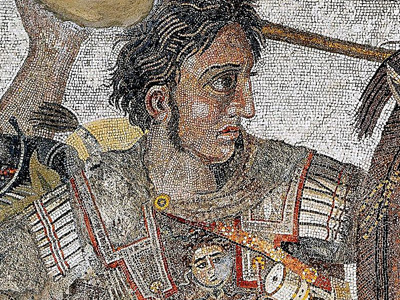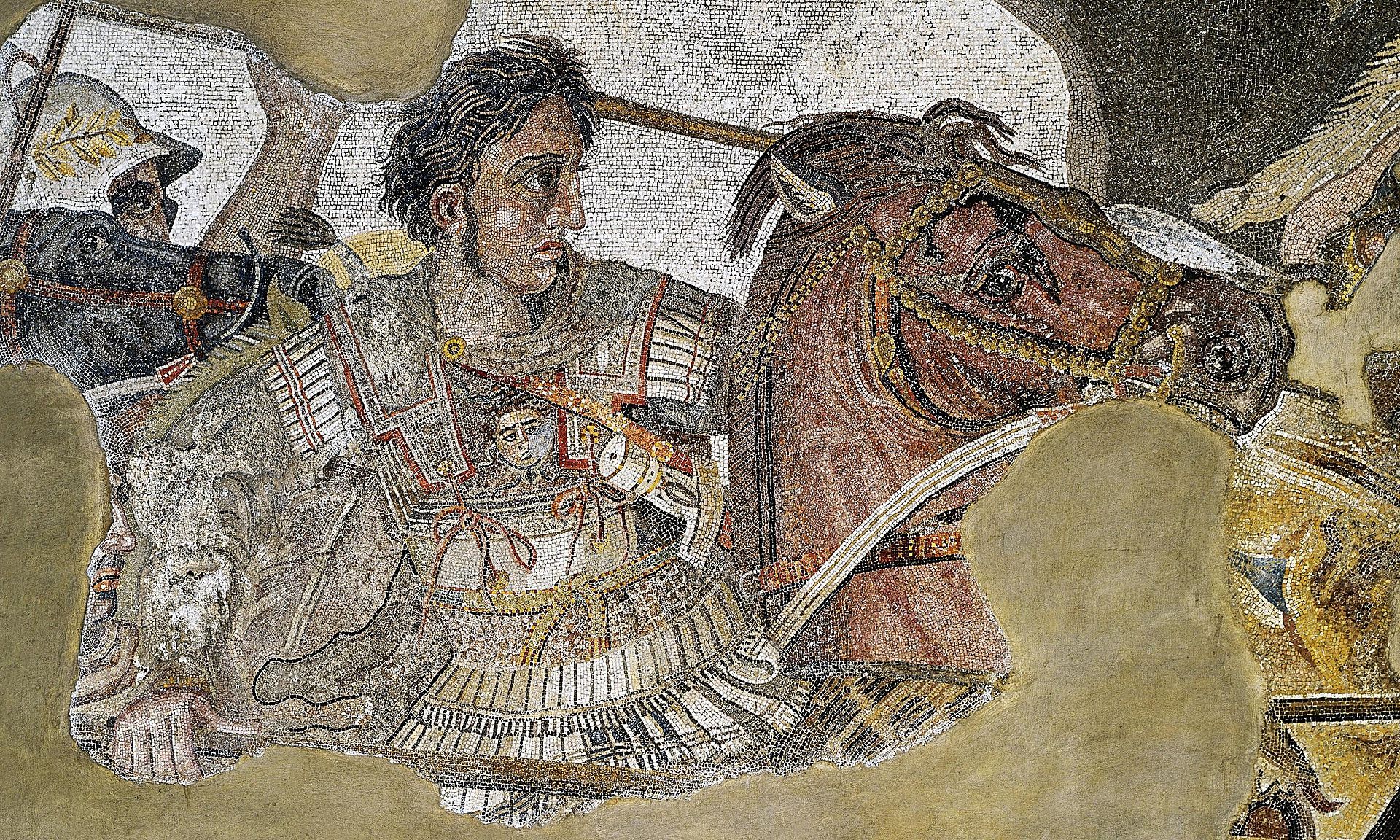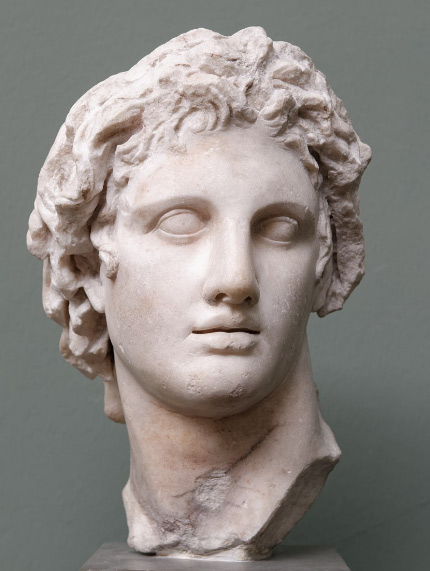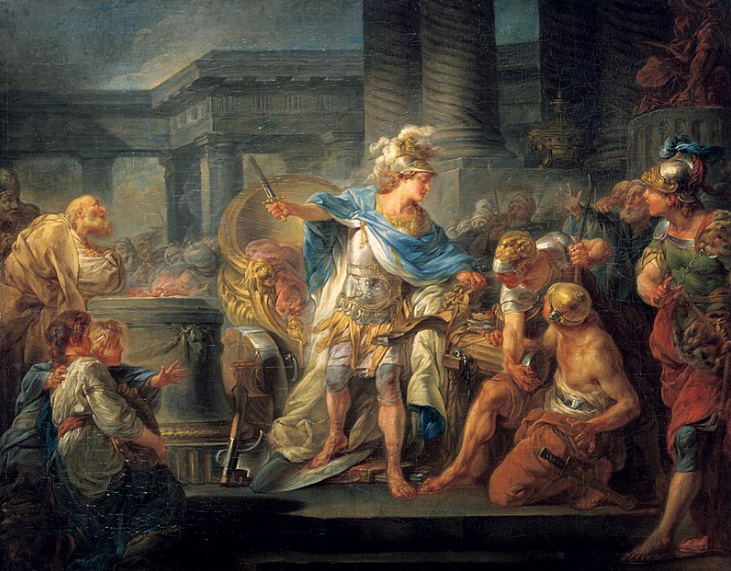Alexander the Great (356-323 BC)
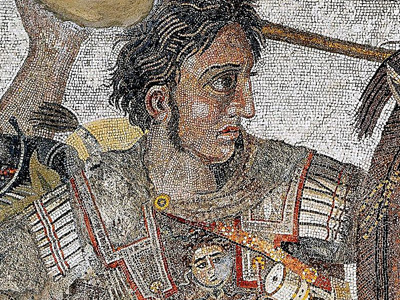
Early Life
Lineage and Childhood
Alexander was born on the sixth day of the ancient Greek month of Hekatombaion, which probably corresponds to 20 July 356 BC, although the exact date is disputed, in Pella, the capital of the Kingdom of Macedon. He was the son of the king of Macedon, Philip II, and his fourth wife, Olympias, the daughter of Neoptolemus I, king of Epirus. Although Philip had seven or eight wives, Olympias was his principal wife for some time, likely because she gave birth to Alexander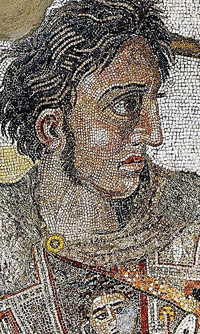 Alexander the Great (356-323 BC), was a king of the Ancient Greek kingdom of Macedon. He spent most of his ruling years on an unprecedented military campaign through Asia and northeast Africa. He was undefeated in battle and is widely considered one of history's most successful military commanders. Alexander the Great ».
Alexander the Great (356-323 BC), was a king of the Ancient Greek kingdom of Macedon. He spent most of his ruling years on an unprecedented military campaign through Asia and northeast Africa. He was undefeated in battle and is widely considered one of history's most successful military commanders. Alexander the Great ».
Several legends surround Alexander's birth and childhood. According to the ancient Greek biographer Plutarch, on the eve of the consummation of her marriage to Philip, Olympias dreamed that her womb was struck by a thunder bolt that caused a flame to spread "far and wide" before dying away. Sometime after the wedding, Philip is said to have seen himself, in a dream, securing his wife's womb with a seal engraved with a lion's image. Plutarch offered a variety of interpretations of these dreams: that Olympias was pregnant before her marriage, indicated by the sealing of her womb; or that Alexander's father was Zeus. Ancient commentators were divided about whether the ambitious Olympias promulgated the story of Alexander's divine parentage, variously claiming that she had told Alexander, or that she dismissed the suggestion as impious.
On the day Alexander was born, Philip was preparing a siege on the city of Potidea on the peninsula of Chalcidice. That same day, Philip received news that his general Parmenion had defeated the combined Illyrian and Paeonian armies, and that his horses had won at the Olympic Games. It was also said that on this day, the Temple of Artemis in Ephesus, one of the Seven Wonders of the World, burnt down. This led Hegesias of Magnesia to say that it had burnt down because Artemis was away, attending the birth of Alexander. Such legends may have emerged when Alexander was king, and possibly at his own instigation, to show that he was superhuman and destined for greatness from conception.
In his early years, Alexander was raised by a nurse, Lanike, sister of Alexander's future general Cleitus the Black. Later in his childhood, Alexander was tutored by the strict Leonidas, a relative of his mother, and by Lysimachus of Acarnania. Alexander was raised in the manner of noble Macedonian youths, learning to read, play the lyre, ride, fight, and hunt.
When Alexander was ten years old, a trader from Thessaly brought Philip a horse, which he offered to sell for thirteen talents. The horse refused to be mounted, and Philip ordered it away. Alexander however, detecting the horse's fear of its own shadow, asked to tame the horse, which he eventually managed. Plutarch stated that Philip, overjoyed at this display of courage and ambition, kissed his son tearfully, declaring: "My boy, you must find a kingdom big enough for your ambitions. Macedon is too small for you", and bought the horse for him. Alexander named it Bucephalas, meaning "ox-head". Bucephalas carried Alexander as far as India. When the animal died (because of old age, according to Plutarch, at age thirty), Alexander named a city after him, Bucephala.
Adolescence and Education
When Alexander was 13, Philip began to search for a tutor, and considered such academics as Isocrates and Speusippus, the latter offering to resign to take up the post. In the end, Philip chose Aristotle and provided the Temple of the Nymphs at Mieza as a classroom. In return for teaching Alexander, Philip agreed to rebuild Aristotle's hometown of Stageira, which Philip had razed, and to repopulate it by buying and freeing the ex-citizens who were slaves, or pardoning those who were in exile.
Mieza was like a boarding school for Alexander and the children of Macedonian nobles, such as Ptolemy, Hephaistion, and Cassander. Many of these students would become his friends and future generals, and are often known as the 'Companions'. Aristotle taught Alexander and his companions about medicine, philosophy, morals, religion, logic, and art. Under Aristotle's tutelage, Alexander developed a passion for the works of Homer, and in particular the Iliad; Aristotle gave him an annotated copy, which Alexander later carried on his campaigns.
HISTORY

RESOURCES
This article uses material from the Wikipedia article "Alexander the Great", which is released under the Creative Commons Attribution-Share-Alike License 3.0.
© Stories Preschool. All Rights Reserved.
